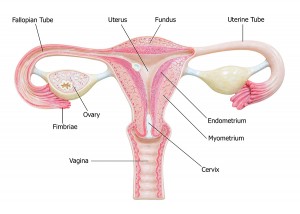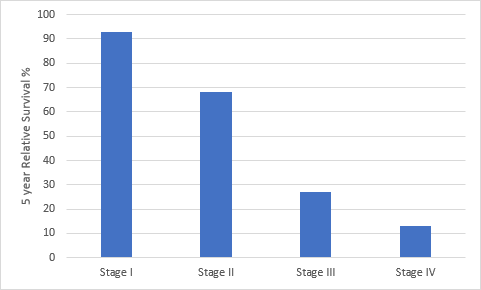Ovarian cancer is a disease that occurs when abnormal cells in the ovaries grow at an uncontrollable rate and form a mass of tissue known as a tumour. Many types of tumours can start in the fallopian tubes or one or both ovaries.
Some tumours are not cancerous (also known as “benign”) and never spread beyond the ovaries or fallopian tubes. However, other tumours may be cancerous (“malignant”) and may spread to other parts of the body, such as the pelvis or abdomen. Treatment for ovarian cancer often involves surgical removal of the tumours, chemotherapy and/or radiation therapy.
About 7,500 women in the UK are diagnosed with ovarian cancer and 4,100 women will die each year.
The ovaries
Symptoms of ovarian cancer
The symptoms of ovarian cancer can be difficult to recognise, particularly in its early stages. This is because the symptoms are similar to those of other less serious conditions, such as irritable bowel syndrome (IBS) or pre-menstrual syndrome (PMS).
However, symptoms that are most commonly reported in women diagnosed with ovarian cancer are:
- Increased abdominal size and persistent bloating
- Persistent pelvic and abdominal pain
- Difficulty eating and feeling full quickly, or feeling nauseous
Other symptoms include back pain, unexplained bleeding, needing to pass urine more frequently than usual, pain during sexual intercourse, constipation and fatigue.
If you notice any of these symptoms for two or more weeks, you should go and see your doctor for an evaluation. The sooner ovarian cancer is found and treated, the better the chance of recovery.
Risk of developing ovarian cancer
1 in 52 women will be diagnosed with ovarian cancer during their lifetime. However, there are certain factors that can increase that risk further:
- Increasing age
- Carrying a mutation in the BRCA 1/2 and/or Lynch syndrome genes
- Having a known family history of ovarian and/or breast cancer
- Being of Ashkenazi Jewish descent with a known family history of ovarian or breast cancer
Importance of Early Detection
Early detection of ovarian cancer means longer survival
If ovarian cancer is diagnosed at the earliest stage, when it is still confined to one ovary, then up to 9 out of 10 women will still be alive 5 years later. However, only one-third of women with ovarian cancers are diagnosed in the early stages.1
Unfortunately, many ovarian cancers are diagnosed at the late stage. This means that many women will not be treated until it is too late, and their treatment options may be more limited.
Survival Rates by Stage
https://www.cancerresearchuk.org/health-professional/cancer-statistics/statistics-by-cancer-type/ovarian-cancer/risk-factors#heading-Zero Last accessed Oct 2022.
http://www.nhs.uk/Conditions/Cancer-of-the-ovary/Pages/Symptoms.aspx. Last accessed Oct 2022.
http://www.cancerresearchuk.org/health-professional/cancer-statistics/statistics-by-cancer-type/ovarian-cancer/survival#heading-Three. Last accessed Oct 2022.
http://www.cancerresearchuk.org/health-professional/cancer-statistics/statistics-by-cancer-type/ovarian-cancer/survival#heading-Three. Last accessed October 2022.
Find support
We understand that getting a BRCA 1 or BRCA 2 diagnosis can be very difficult. There is support and we have listed some of the incredible charities and support groups that may be able to help you and provide you with additional support.
Frequently Asked Questions
Certain factors can increase your chance of having ovarian cancer:
If you are aged over 50 and have gone through menopause
If you have any of the following:
A known mutation in the BRCA1, BRCA2 and/or Lynch syndrome genes
A known family history of ovarian and/or breast cancer
Relatives of Ashkenazi Jewish descent with family history of ovarian/breast cancer
Having one or more of these risk factors does not mean you will develop ovarian cancer. The most important thing you can do is to watch for early symptoms and talk to your doctor if you are concerned.
Whilst the majority of ovarian cancer are not inherited, about 20 to 25 percent of women diagnosed with ovarian cancer have a hereditary tendency to develop the disease. If you have relatives with breast and/or ovarian cancer, you may be at higher risk for developing ovarian cancer.
In some cases, this may be due to an inherited mutation in either the BRCA1 and/or BRCA2 gene. These genes are present in everyone, but in some people they can appear in a different form, and may lead to an increased chance of breast and/or ovarian cancer.
Your doctor can assess your medical and personal family history and advise you on your own lifetime risk of ovarian cancer.



